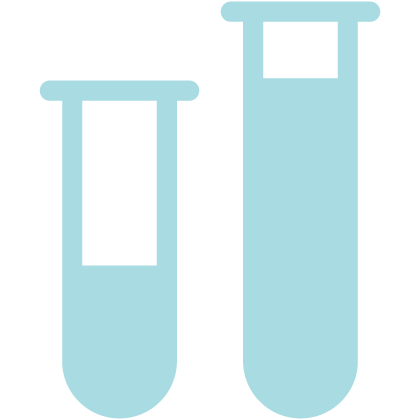Initial Assessment
An initial lab assessment will include:
Traditional Lipid Panel
Total cholesterol, LDL-C, HDL-C, triglycerides and non-HDL.
Apo B
Marker of atherogenic (plaque-producing) particles, more predictive of cardiovascular risk than LDL cholesterol.
Lipoprotein Particle Profile
Advanced cholesterol testing which accurately measures the number of lipoprotein particles. Studies have clearly demonstrated that elevated LDL particle concentration is associated with increased risk of heart disease even in the presence of normal LDL cholesterol. The presence of small LDL particles can indicate insulin resistance, metabolic syndrome, and prediabetes.
Lipoprotein (a)
Genetic, highly atherogenic (plaque-producing) particle associated with increased cardiovascular risk.
Insulin Resistance Score (IR Score)
Provides information about the risk for diabetes and also data that allows us to determine alternative treatment options for high cholesterol other than traditional therapies; also helps determine why patients may easily gain weight in the abdomen and have difficulty losing weight in general.
Absorption and Synthesis Markers
Determines if your liver is making too much cholesterol or you are over absorbing cholesterol. Helps determine the appropriate treatment for elevated cholesterol.
Lp-PLA2
The test for Lp-PLA2 is the only blood test cleared by the FDA that helps to identify hidden risk for heart attack and stroke. When the Lp-PLA2 is elevated, it indicates arterial inflammation, making heart attack and stroke more likely.
Methylenetetrahydrofolate Reductase (MTHFR)
Having a mutation on one or both of these genes can lead to decreased production of L-methylfolate, the body’s usable form of folate.
Omega-3 Index
Determines omega-3 level in red blood cells. Low levels are associated with increased cardiovascular risk.
Aspirinworks
Used to assess platelet activity and associated increased risks for cardiovascular events. Helps identify individuals in whom aspirin would be beneficial, as well as monitoring response to the aspirin.
25 OH Vitamin D
Vitamin D deficiency is highly prevalent and associated with hypertension, inflammation, metabolic syndrome and increased cardiovascular risk.
B12
Common deficiency which also may be depleted when using certain medications.
Thyroid Panel, Including TSH, FT4, FT3 and Thyroid Antibodies
Thyroid, if not functioning properly, could play a role in high cholesterol. Antibodies detect an autoimmune disorder known as Hashimoto’s hypothyroid, which can cause symptoms of hypothyroid, including weight gain, hair loss and feeling cold, while thyroid labs labs remain normal.
hsCRP
An inflammatory marker that if elevated can be associated with increased risk of heart disease.
CorusCAD
The CorusCAD gene expression test shows what is happening in your arteries right now. It is not a genetic test which provides information about future risk. CorusCAD measures the activity level of specific genes in your blood that likely reflect the amount of plaque currently in your arteries. Your CorusCAD score is calculated using your gene expression, gender, and age and can help rule out obstructive CAD.
Our initial lab assessment will also include the following inflammatory markers:
Myeloperoxidase (MPO)
MPO measures disease activity, and elevated levels predict the risk of heart disease in groups otherwise associated with low risks.
Lipoprotein-associated Phospholipase-A2 (Lp-PLA2)
Elevated Lp-PLA2 levels can predict the development of CAD in apparently healthy individuals, and can also predict the risk of future adverse cardiac and cerebrovascular events due to vulnerable plaque.
High-Sensitivity C-Reactive Protein (hsCRP)
Elevated hsCRP is associated with the risk of future adverse cardiovascular event (heart attack, stroke and death) in apparently healthy individuals and in individuals with stable CAD.
ADMA/SDMA
Elevated ADMA levels are associated with the presence of hypertension, insulin resistance and hyperlipidemia. Individuals with established coronary artery disease and elevated ADMA levels have more than twice the risk for adverse event (MI, Stroke) than those with normal ADMA levels. Elevated SDMA levels are associated with reduced kidney function.
Oxidized LDL (OxLDL)
Individuals with elevated OxLDL are more 3.5 times more likely to develop metabolic syndrome in the next five years. Increased OxLDL is also associated with presence of coronary artery disease.
F2-Isoprostanes (F2-IsoPs)
Elevated levels are seen in conditions associated with increased risk for atherosclerosis and certain forms of cancer. Lower steady states levels are associated with cardiovascular fitness and reduced risks.
Advanced Lipid Testing
Traditional Lipid Panel
Total Cholesterol, LDL-C, HDL-C and triglycerides.
Apolipoprotein B (Apo B) and A1 (ApoA1)
Marker of atherogenic (plaque-producing) particles, more predictive of cardiovascular risk than LDL cholesterol.
Lipoprotein Particle Profile
50% of people suffering from heart attacks have shown “normal” cholesterol numbers. Cholesterol has historically been used as the standard indicator for cardiovascular disease, being classified as HDL (good) or LDL (bad). However, it is actually the lipoprotein particles that carry the cholesterol throughout the body, not the cholesterol within them, that are responsible for key steps in plaque production and the resulting development of cardiovascular disease.
Measuring the lipoprotein subgroups is the only way to evaluate emerging risk factors, which is crucial for accurate assessment of cardiovascular risk.
Lipoprotein(a)
Elevated Lp(a) levels signify increase risk for coronary artery disease and are associated with increased risk of myocardial infarction. Lp(a) is elevated in ischemic stroke patients, and correlates with carotid artery atherosclerosis.
HDL2b
Reduced HDL2B levels have been associated with insulin resistance.
Metabolic Testing
Trimethylamine N-oxide (TMAO)
Elevated TMAO levels are associated with increased risk of cardiovascular disease or major adverse cardiovascular events (heart attack, stroke or death).
Adiponectin
Individuals with lower adiponectin levels have 3 times greater risk of developing metabolic syndrome. Individuals with the lowest levels of adiponectin are up to 9 times as likely to develop type 2 diabetes. Individuals with low adiponectin levels have a 2 times increase in the prevalence of coronary artery disease.
Insulin
Insulin testing is ordered to help evaluate insulin production, to monitor insulin resistance, to help determine the cause of hypoglycemia and to detect an insulin-producing tumor.
Homocysteine
A homocysteine test may be used to screen individuals at high risk of a myocardial infarction or stroke, or individuals with a family history of coronary artery disease but no known risk factors, and is also used to confirm Vitamin B12 or folic acid deficiency.
Miscellaneous Testing
OmegaCheck
Consumption of omega-3 leads to reduction in triglycerides, non-HDL and Lp_PLA2 levels, and reduces the occurrence of major acute cardiac events in healthy individuals, those with cardiovascular risk factors and those who have cardiovascular disease.
Coenzyme Q10 (CoQ10)
Statin use may inhibit the production of CoQ10 by as much as 40%. Deficiency of CoQ10 contributes to mitochondrial and muscle dysfunction.
25 OH Vitamin D
Vitamin D deficiency is highly prevalent and associated with hypertension, inflammation, metabolic syndrome and increased cardiovascular risk.
Coagulation/Platelet Function
AspirinWorks
The effectiveness of aspirin therapy varies from individual to individual. Aspirin-insensitive individuals are twice as likely to have a cardiovascular event.
Fibrinogen
Elevated fibrinogen levels are also associated with coronary heart disease, myocardial infarction, peripheral arterial disease, acute infections, inflammatory disorders, trauma, malignancy, pregnancy, and cigarette smoking. Elevated fibrinogen levels increase the risks of developing a blood clot.
Other Advanced Cardiovascular Tests
Galectin-3 (Gal-3)
Elevated levels of galectin-3 in hypertensive individuals may suggest increased inflammation, collagen deposition and fibrosis that can lead to adverse cardiac remodeling.
N-Terminal proBNP (NT-proBNP)
NT-proBNP test may be used to assess myocardial stretch and support risk stratification of individuals with stable CAD or acute heart failure.
Labwork may also include genetic testing and/or additional testing as determined by the provider:
Genetic Tests
CYP2C19
Poor metabolizers (loss of CYP2C19 activity) have 2 times the risk of having a subsequent adverse cardiac event while receiving treatment with clopidogrel (Plavix) after a myocardial infarction. Ultra-rapid metabolizers (increased CYP2C19 activity) have reduced risk of major cardiovascular event while being treated with clopidogrel, but are at increased risk of bleeding.
Apolipoprotein E
An individual’s ApoE genotype may affect their lipid levels, determine response to lifestyle modifications and responsiveness to treatment with statins.
Methylenetetrahydrofolate Reductase (MTHFR)
A MTHFR mutation can be a risk factor for cardiovascular disease, increased risk for arterial and venous thrombosis, and an increased risk for obstetrical complications, e.g., preeclampsia, abruptio placentae, fetal growth retardation, and stillbirth.
Prothrombin (Factor II) 20210G>A Mutation Analysis
Factor II Mutation (G20210A) is one of the most common causes of venous thrombosis. 2.3% of the general population is heterozygous in contrast with 6.2% of patients with venous thrombosis and 18% with familial venous thrombosis.
Factor V Leiden Mutation
This mutation is associated with increased risk of venous thrombosis.
Additional Testing
CorusCAD
The CorusCAD test shows what is happening in your arteries right now. It is not a genetic test which provides information on future risks. CorusCAD measures the activity level of specific genes in your blood that likely reflect the amount of plaque currently in your arteries and can help rule out obstructive coronary artery disease.
PULS Cardiac Test
The PULS Cardiac Test enhances risk assessment by evaluating clinical risk factors, as well as seven unique protein biomarkers associated with atherosclerotic disease progression and plaque vulnerability.
GlycoMark
The GlycoMark test works by monitoring levels of the 1,5-anhydroglucitol (1,5-AG) molecule in the blood. 1,5-AG levels provide insight into the average daily peak glucose levels, revealing information about hyperglycemia that can’t be uncovered by HgA1C alone.
Fructosamine
Fructosamine may be used to monitor average glucose levels in individuals with diabetes over a two-week time period. It measures the glycosylation of circulating serum albumin.
C-peptide
A C-peptide test may be used for individuals with newly-diagnosed diabetes to determine the degree of pancreatic beta-cell function, as well as for individuals with diabetes to determine whether to initiate insulin therapy. The test can also be used in individuals with suspected insulin resistance/metabolic syndrome.
Cystatin-C
Cystatin-C can be used as a prognostic marker for acute heart failure and cardiovascular disease. It is also used for the assessment of renal function.
Sex Hormone Panels
Sex Hormone Binding Globulin (SHBG)
The sex hormone binding globulin test may be used for the diagnosis of polycystic ovary syndrome (PCOS) in women. The test may also have utility for the diagnosis and follow-up of insulin resistance, as well as cardiovascular and type 2 diabetes risk, particularly in women.
Dehydroepiandrosterone (DHEA)
A DHEA test may be used for the evaluation of adrenal function and to identify whether androgen-secreting conditions are caused by the adrenal glands or the gonads.
Follicle-stimulating Hormone
Follicle-stimulating hormone testing is used for women suspected of having polycystic ovary syndrome, and in individuals undergoing evaluation for infertility. of the ovaries or testes.
Testosterone: Free, Bioavailable and Total
Testosterone tests may be used to evaluate infertility, erectile dysfunction, or osteoporosis in men and to evaluate hirsutism, polycystic ovary syndrome, and virilization in women.

